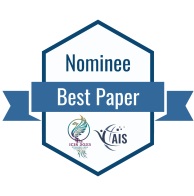Loading...
Paper Number
1499
Paper Type
Completed
Description
Artificial intelligence (AI) is transforming the nature of work and reshaping labor markets. Viewing labor as a bundle of skills, recent research has analyzed AI skills and offered important insights about the impacts of AI on labor markets. We add to this on-going discourse and argue that taking a dynamic skill-based approach to measurement is critical: just like the development of AI is emergent and ever-evolving, so are AI skills. Taking stock of the literature, we show that existing studies tend to take a static approach to measuring AI skills, which fails to fully reflect the dynamic phenomenon of AI skills and could cause measurement errors. We propose a dynamic co-occurrence method and demonstrate that it performs better than the extant static methods, which can cause severe Type I and II errors, omit emerging AI skills, and temporally over- and under-estimate the demands for AI skills and jobs.
Recommended Citation
Kim, Jeongmin; Rai, Arun; and Lin, Yu-Kai, "AI Labor Markets: Toward a Dynamic Skills-Based Approach to Measurement" (2023). ICIS 2023 Proceedings. 6.
https://aisel.aisnet.org/icis2023/techandfow/techandfow/6
AI Labor Markets: Toward a Dynamic Skills-Based Approach to Measurement
Artificial intelligence (AI) is transforming the nature of work and reshaping labor markets. Viewing labor as a bundle of skills, recent research has analyzed AI skills and offered important insights about the impacts of AI on labor markets. We add to this on-going discourse and argue that taking a dynamic skill-based approach to measurement is critical: just like the development of AI is emergent and ever-evolving, so are AI skills. Taking stock of the literature, we show that existing studies tend to take a static approach to measuring AI skills, which fails to fully reflect the dynamic phenomenon of AI skills and could cause measurement errors. We propose a dynamic co-occurrence method and demonstrate that it performs better than the extant static methods, which can cause severe Type I and II errors, omit emerging AI skills, and temporally over- and under-estimate the demands for AI skills and jobs.
When commenting on articles, please be friendly, welcoming, respectful and abide by the AIS eLibrary Discussion Thread Code of Conduct posted here.




Comments
04-Work